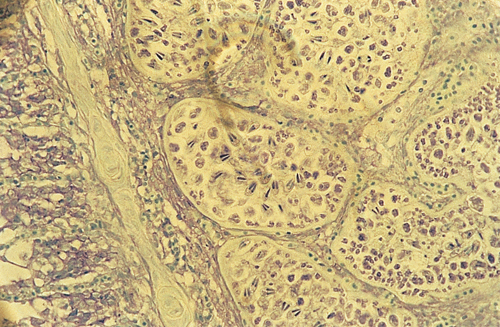Difference between revisions of "Ornamental Fish Q&A 15"
(Created page with "[[|centre|500px]] <br /> '''This slide from the gill of a koi carp has been stained with Giemsa stain.''' <br /> <FlashCard questions="2"> |q1=What characteristic structures ...") |
|||
| (2 intermediate revisions by 2 users not shown) | |||
| Line 1: | Line 1: | ||
| − | [[|centre|500px]] | + | {{Manson |
| + | |book = Ornamental Fish Q&A}} | ||
| + | |||
| + | [[File:Ornamental Fish 15.jpg|centre|500px]] | ||
<br /> | <br /> | ||
| Line 13: | Line 16: | ||
The section stained with Giemsa indicates the distinct polar bodies characteristic of the myxozoan parasite, ''Henneguya koi''. | The section stained with Giemsa indicates the distinct polar bodies characteristic of the myxozoan parasite, ''Henneguya koi''. | ||
| − | |l1= | + | |l1=Henneguya koi |
|q2=What is the organism? Describe its life cycle. | |q2=What is the organism? Describe its life cycle. | ||
|a2= | |a2= | ||
| Line 21: | Line 24: | ||
There is no treatment, although it is wise to remove the affected fish to avoid spread to others. | There is no treatment, although it is wise to remove the affected fish to avoid spread to others. | ||
| − | |l2= | + | |l2=Henneguya koi |
</FlashCard> | </FlashCard> | ||
Latest revision as of 22:30, 30 October 2011
| This question was provided by Manson Publishing as part of the OVAL Project. See more Ornamental Fish Q&A. |
This slide from the gill of a koi carp has been stained with Giemsa stain.
| Question | Answer | Article | |
| What characteristic structures are visible? | The gross lesions of this condition appear as small, discrete, smooth, rounded nodules on the gill. The color is similar to that of the surrounding gill tissue with no apparent hyperemia or inflammation. The section stained with Giemsa indicates the distinct polar bodies characteristic of the myxozoan parasite, Henneguya koi. |
Link to Article | |
| What is the organism? Describe its life cycle. | Henneguya koi is an intracellular parasite, which invades target cells and develops into a pseudocyst, producing large numbers of spores. Spores are normally released when the fish dies, although they can be released earlier if pseudocysts situated on the epithelial surface rupture. Usually only individual fish are affected. There is no treatment, although it is wise to remove the affected fish to avoid spread to others. |
Link to Article | |
